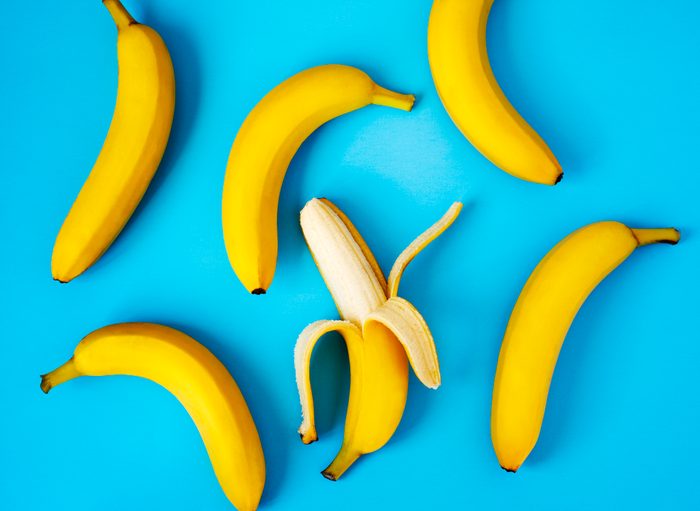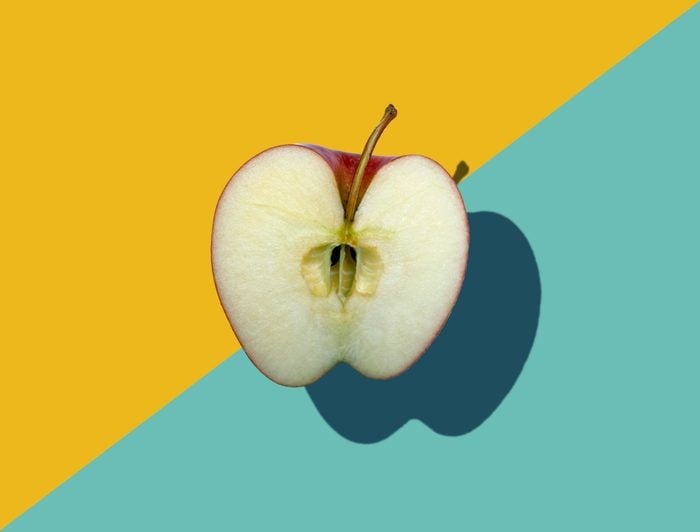
Who knew?!
Learning random trivia facts is lots of fun, but at the end of the day, it’s just little bits of information that take up space in your brain, right? Not necessarily! Check out these fun facts that might just provide some useful information, impress those around you, or at the very least, boost your morale a little! And if you’re hungry for even more random trivia, check out these 100 interesting facts about just about everything. Plus, if you have Netflix, you can even answer tons of trivia questions with their interactive trivia game—Triviaverse. Or, if you consider yourself a film buff, see how many of these movie trivia questions you can get right.

Sarcasm boosts creativity
You may not think of sarcasm as the most endearing habit or quality. If you tend to have a sarcastic sense of humor, you’ve probably been told to tone it down at least once. But according to this bit of random trivia, sarcastic people get the last laugh—studies have shown that sarcasm boosts your creativity. And as if that weren’t enough of a reason to embrace the snark, sarcasm can also boost the creativity of the recipients, too! Using it involves making connections between opposing ideas, and interpreting it also requires your brain to reason beyond the literal.

The chance of a coin landing heads-up is not 50-50
When you flip a coin, physics, not probability, determines how it will land. Mathematician Persi Diaconis found that a coin is slightly more likely to land on the face that was up when you flipped it. The way a coin lands is not “random”; it’s easy, with a little practice, to manipulate your coin flip so that it lands the way you want it. What’s more, if you’re spinning a coin, it’s more likely to land tails up, since the heads side weighs slightly more. Here are some more “facts” you’ve always believed that are actually false.

There’s an equation to tell how far away the horizon is
“The horizon,” a distant concept that might seem almost abstract, might be closer than you think. There’s an equation that, if you know how far above sea level you’re looking from, can tell you the distance of the horizon. The neatest application of this rule is that if you’re six feet tall, standing at sea level, your eyes are about five and a half feet above sea level—and the horizon is approximately three miles away. The equation does require a calculator—the actual equation is “√(height above surface / 0.5736) = distance to horizon”—but it’s still handy to know there’s a way to figure it out!

If you’re ever attacked by a crocodile, stick your thumb in its eye
Easier said than done, of course, but wildlife experts agree that this is the best way to save yourself in the event of a crocodile attack. The same goes for an alligator, too. The eyes are the most sensitive part of its body, and jabbing at them should, ideally, cause them to loosen their jaws. (Your fingers will do if you don’t have the presence of mind to specifically use the thumb.) For some more random trivia about these big reptiles, here’s the difference between alligators and crocodiles (and more animal distinctions you didn’t know).

The shortest sentence in English is “Go.”
Yes, “Go,” all of two letters is a grammatically correct English sentence. It’s only a sentence, though, if it’s a command, because then “you” is the understood subject. It’s commanding the listener to go. If you’d rather a sentence with a separate word as the subject, “I am” is the shortest sentence, with three letters.

A “jiffy” is a real unit of time
Ever told someone you’d be back in a “jiffy”? You were definitely lying. Though the English language has adopted it to mean “a short amount of time,” it actually is a scientific term. In the physics world, a “jiffy” is the time it takes light to travel a centimeter in a vacuum or around 33.4 picoseconds. (A “picosecond,” meanwhile, is a trillionth of a second.)

Money isn’t really made of paper
Turns out “paper money” is a bit of a misnomer! According to the Bureau of Printing and Engraving, money is actually 75 percent cotton and 25 percent linen, which “gives [it] its distinct look and feel.” Here are some more misnomers that don’t mean what you think they do. Plus, check out this random trivia about money.

Orange is the worst color to wear to a job interview
The color orange will make the worst first impression at a job interview, according to a Career Builder survey. Twenty-five percent of respondents claimed that the bright color comes across as unprofessional. The best color to wear, in case you’re wondering, is blue. Here are some more cool facts about the things you use every day.

At one point, you were the youngest person on Earth
The moment you were born, you were the youngest person in the world, however briefly. Pretty cool, right? Check out these other unbelievable facts about newborn babies.

Sleeping burns more calories than watching TV
Yes, you burn calories in your sleep—and usually more than you do while watching the tube. The main reason for this is that our sleeping selves take in exactly zero calories, but while we’re watching the tube, we often get tempted to eat. Commercials and product placement don’t help matters. Take a look at some more mind-blowing facts you’ll think are made up (but aren’t!).

Video game soundtracks are the best music to listen to for concentration
Next time you really need to focus on a work project or notes for an upcoming test, try listening to video game music. This is because their purpose is to keep you focused on the task at hand, providing some atmosphere for the game without being overpowering or distracting. So if you need some tunes for the next time you’re working or studying, check out this compilation of instrumental video game music. For more trivia, these are the 20 facts you learned in school that are no longer true.

“Mouses” is an acceptable plural for a computer mouse…
It’s no secret that English-language plurals can be very perplexing. Why is the plural for “house” “houses,” but the plural of “mouse” is not “mouses”? Well, in the context of a computer mouse, it is! According to Merriam-Webster, “mouses” is an acceptable plural form for the technological use of “mouse.” (Though you can still use “mice,” too.) Whether you think that makes matters easier or even more confusing is up to you. Get a look at some irregular English plurals that just sound totally wrong.

…and the speed of a computer mouse is measured in “mickeys”
Someone was having a little fun when they came up with this. And we love them for it. Technically, a “mickey” is 1/200th of an inch. The speed can be measured in “pixels per mickey,” referring to how many pixels the cursor on the screen moves when the physical mouse is moved one mickey. How’s that for hidden Mickeys?

There’s a cat version of a Corgi
Oh yes, cat lovers. This precious ball of fluff is called a “Munchkin cat,” and, like the corgi and the dachshund, its short legs and long body are the results of a genetic mutation. If a cat possesses the autosomal dominant gene, which causes the leg bones to grow shorter, it can pass the trait on to its kittens.

A banana is a berry (and a strawberry isn’t)
Talk about berry confusing! This is because a “berry” is technically a fruit with three distinct layers—a thick outer one; a middle one containing most of the edible fruit; and an inner one that contains the seeds. The fruit also must come from a flower with only one ovary. By this classification, grapes are berries as well, but strawberries aren’t. Botanists don’t seem to be particularly beholden to this naming system. Learn some more science trivia facts that everyone gets wrong.

Central Park’s lampposts have numbers on them specific to their location
Lampposts in Central Park have numbers on them to help you keep track of where you are. If you’re lost in the massive park, take a look at the nearest lamppost. There will be four numbers on it. The first two are the digits of the nearest numbered street, and the second two reveal whether you’re on the east or west side of the park. Odd numbers reveal that you’re on the west side of the park; even numbers signify east. The numbers have been there as long as the lampposts themselves—since the 19th century. New York isn’t the only state that will blow your mind. Check out our favorite facts about every U.S. state.

People with blue eyes have a higher alcohol tolerance
People with blue eyes tend to have a higher tolerance for alcohol and can drink more before they begin to feel the effects, according to a Georgia State University study. The flip side of this bit of random trivia? It also means that blue-eyed people are more likely to become dependent on alcohol. Researchers discovered a significant link between the genes that determine eye color and the genes that impact addictive habits. (Although, of course, you should drink responsibly no matter what color your eyes are.)

You can start a fire with Doritos
Doritos chips are flammable and can start a fire if you’re in need of kindling. The oil and seasoning on the chips, especially the spicy varieties, can actually produce a reasonably long-lasting fire, according to Lifehacker. Chew on these other fascinating facts about Doritos as well.

You can break an apple in half with your bare hands
Paul Rudd blew people’s minds in 2019 when he split an apple in half in a Netflix video. But others were quick to point out that this was not a show of superhuman strength; it’s actually very possible with a little bit of practice. Lifehacker recommends pressing the muscular base of both thumbs into the divot at the top of the apple (you can cut off the stem to make that easier; it’s totally not cheating). Then squeeze the apple top to bottom and pull your hands apart, almost like you’re opening a book. Smaller, crunchier apples work best. Check out these other things to wonder about that you likely never thought of before.

Only two body parts never stop growing
Well, three, technically: your nose and your ears. Once you’re “done growing” as an adolescent, the number of cells in most parts of your body remains fixed, meaning you don’t grow anymore. The cells themselves can still increase and decrease in size, meaning your overall body size can increase or decrease, but only cells in your nose and ears continue to duplicate.

There are glow-in-the-dark Life Savers
Move over, Pop Rocks! There’s a type of Life Saver that will emit light-up “sparks” as you eat them. (It’s those white ones you’ve probably seen in a public-place candy basket.) There’s some perplexing, complicated science involved, but thanks to the electron-expelling nature of the crystalline sugars in Wint-O-Green Life Savers, they’ll glow in the dark. When the electrons meet nitrogen in the air, the nitrogen molecules light up. (Technically, all hard candies made with crystalline sugars emit a slight visible light when they crack.) But since Wint-O-Green Life Savers contain oil of wintergreen, which has fluorescent properties, that visible light is much more, well, visible. Check out some more extraordinary uses for things you already have in your house.

Nearly six times as many people speak English as a second language than as a first language
Have you ever traveled internationally and noticed that signs still have English instructions on them, and many people seem to know some basic English? That’s because a full two billion people around the world speak English as a second language, according to the New Yorker. That’s approximately six (slightly more than 5.7) times the number of native speakers (which is around 350 million people). Which seems pretty impressive, especially considering how English is so confusing.

You’re more likely to die on your birthday than any other day
You have a greater chance of dying on your birthday than you do on any other day. The size of that chance varies depending on age, but it averages out to about 13 percent. Several famous people passed away on their own birthdays, including William Shakespeare, actress Ingrid Bergman, and The Feminine Mystique author Betty Friedan. Studies have revealed that your risk of heart attack and stroke increases on the day you were born by about 22 and 19 percent, respectively. Like these random trivia facts? Check out the fascinating facts about every letter in the alphabet.

The “stomach-gurgle” has a scientific name
The technical name for the noise your stomach makes when it growls is a “borborygmus.” It occurs when gas moves around in your intestines, so saying that your stomach is rumbling is a bit of a misnomer. Check out some more random trivia you never knew about the human body.

Dogs can sense human emotions
Studies have revealed that dogs’ brains have voice-sensitive areas very similar to those of humans, in terms of both location and activity. In a University of Lincoln study, researchers found that dogs were able to correctly pair a sound conveying a certain emotion with a photo of a human depicting that emotion. The dogs had not seen or heard the humans in the photos before the experiment, suggesting that canines have an instinctive ability to differentiate between complex emotions. This is most likely because humans have been domesticating dogs and their ancestors for thousands of years, forging a relationship that’s unique among the animal kingdom. Learn the surprising secrets your dog knows about you.

If you store sour cream or cottage cheese upside down, it’ll last longer
Storing sour cream or cottage cheese upside down can help them last longer. This is because keeping them upside down creates a vacuum in the container, slowing the growth of the bacteria that causes them to spoil. Speaking of time… check out these facts that will warp your sense of time.

Cuddling can speed up the healing
Cuddling can help heal wounds faster. Cuddling, hugging, and other positive forms of contact with a loved one release the hormone oxytocin. Oxytocin can help relieve pain and even accelerate healing by boosting the action of the immune system. Of course, this doesn’t mean we recommend replacing first aid with cuddling, but it means that cuddling is even better for you than you thought. There’s plenty more random trivia where that came from—check out our list of 50 trivia questions only geniuses will get right.


